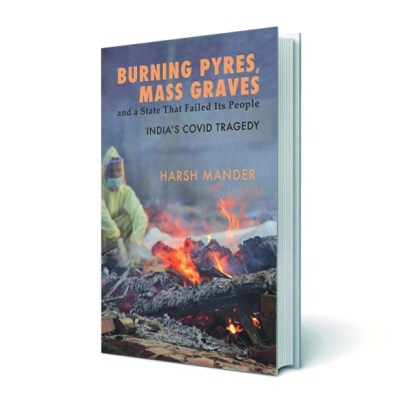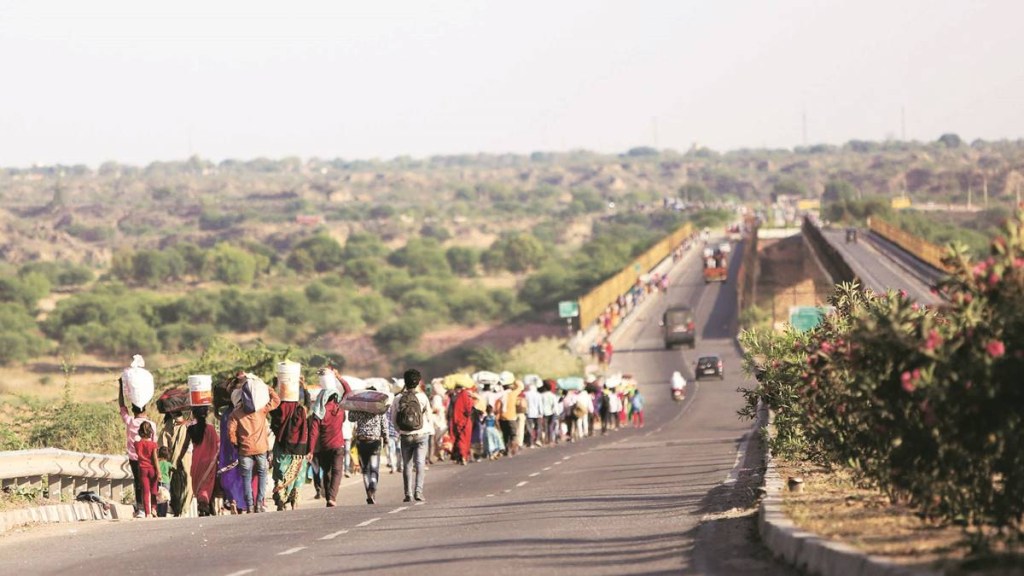By Mohit Hira
Burning Pyres, Mass Graves and a State That Failed Its People: India’s Covid Tragedy
Harsh Mander
Speaking Tiger Books
Pp 400, Rs 599
There are books that sit on shelves. And there are those that lie by my bedside. The former is a collection of titles that have either been read and parked away or will be read some day. And the latter a collection of bingeworthy or snackable titles—the ones I either devour or dip into, but will not let go.
And then there’s a third kind: those that I skim through and tuck away on a set of shelves that hold what libraries would call reference books. Harsh Mander’s Burning Pyres, Mass Graves would sit here.
I say this with no ill will or malice. But simply because its 400-plus pages left me a sense of both anger and ambiguity. Not because the author has been vague— not at all. If anything, his research has been meticulous and borders on the obsessive need to accurately document and cite almost every fact that has gone into its writing. The challenge lies in reading the book without slipping into a state of despondency: the Covid-19 period, the abruptly-enforced lockdown and the news of losing loved ones represents a time no one would want to relive. Yet, Mr Mander does just that. With a series of personal accounts and anecdotes, with data, newspaper reports and global comparisons, he crisscrosses the landscape of sociology, economics and politics.

Peppered with real-life instances of those who suffered, helped, aided and abetted viciousness, Burning Pyres, Mass Graves is a scathing indictment of almost everything that was done by an administration to a people unprepared for a disaster of this magnitude. And so, the anger —the author succeeded in evoking this emotion, if it was intended; and ambiguity—because while he details out so much that was ‘wrong’, the little bits that suggest what could have been done right are also seen from ‘morose’-tinted glasses.
The author may be accused of taking a single-minded point of view—a pessimistic and cuttingly critical one—but the fact is that the Indian who suffered the most from an economic perspective was the daily labourer, the migrant who was uprooted once again. His comparison with Pakistan, which refused to shut down the country because its government took a pragmatic stance to protect the livelihood of its working class, is unlikely to go down well with India’s policymakers. However, Mr Mander is unequivocally clear in his position. The book itself is in two parts: the first “portrays the initial months of the pandemic” and, by his own admittance, was written “in real-time and in red heat” as a first-hand witness. The second section is focused on the deaths and funerals— “There is grief and rage as I look back, and realize the gravity of the culpability of a state that failed its people at a time when they needed it the most.” In that sense, the book is a cathartic and caustic chronicle of a catastrophe.
As he journals the length and breadth of India, one cannot help but give Mr Mander credit for the number and range of real-life anecdotes he has attempted to document here. It appears that personal tragedies may have triggered the genesis of this book, and as an on-ground witness to the upheaval, the calamities that impacted millions of Indians fanned the flames of rage which wrote this tome.
However, while the book is difficult— if not impossible—to read in one go, it is the concluding chapter I would really read and re-read. The author’s ability to empathise with all those who suffered— and I doubt if any demographic was left unscathed by the disease—is expressed emphatically when he writes, “It is my capacity to feel your pain as my own. It is my incapacity to look away when you suffer.” And like the proverbial silver lining of the darkest clouds, he ends with a sense of forlorn hope to reach “the other side of the pandemic, this place of iridescent kindness…”
So, would I recommend Burning Pyres, Mass Graves?
Yes, and no. If you wish to relive the misery and be reminded of all that was “unjust”, do pick it up. But if you—like me —agonised over the ones we loved and lost, and cannot return to that depressive state, leave the book alone. Refer to it if you must, but let not its virulence affect you adversely.
Mohit Hira is co-founder, Myriad Communications & Venture Partner at YourNest Capital Advisors








